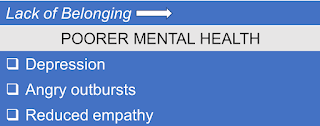We are excited to report that Engineering CAReS, a study of belonging in the engineering and computer science workplace, is now underway! Our long-term project goal is to determine what cultivates healthy, engaging, productive, and inclusive workplaces. (Why is this important? Check out the last post!)
So, that brings us to the first step of the project: the tool
development phase. We have identified the ideas that need to be in the study.
Based on the existing research literature, we know many of the things that lead
to a person feeling more like they belong, in general. But no one has yet
confirmed that these are in fact important in our particular setting of
interest, or how much so.
Some of these things that might impact positive experiences
of workplace culture are pretty straightforward to measure – gender, race, size
of the workgroup or the employer. But many others are abstract concepts like engagement
and self-confidence and autonomy and civility. Happily, psychologists
have already figured out ways to measure these abstractions. However, we need
to be sure that these measurements still work well when applied specifically to
working engineers and computer scientists (and also to those who work with
them!). Also, to make the survey shorter (Yes! We definitely want it to
be shorter), we need to figure out the bare minimum number of questions we can
use on our survey to still get a reliable and reproducible measurement of each
of these concepts. This tool development phase allows us to use statistics to appropriately
reduce the size of the survey.
We also have some suspicions of our own (“hypotheses” is
maybe the more official term?) about additional things that might be of
particular importance within technical workplaces. These abstract concepts
don’t yet have a scientifically validated way to measure them, yet. So this
tool development phase allows for that, as well.
Tool development, then, is actually a really exciting phase!
But you might be starting to notice the big challenges, too. First, the survey
at this stage is long – about 25 minutes long. (For those of you who have
already completed it, thank you!!) And second, statistics are the name of the
game, and we need enough people now, in Phase 1, to be able to whittle the
survey down for Phase 2 when we recruit a much larger number of people.
How many people, you ask? Well, for this first phase, we
need at least 360 people to complete the survey. We are fresh out of the
gate and need willing participants to help us out. If you have already
completed the survey, thank you! If not, then please join us!
AND... can you think
of a few other people you know who might find the project intriguing enough to
also complete this Phase 1 survey? Anyone who has worked in the U.S. as an
engineer or computer scientist (or worked very closely with them) at any time
in the past 20 years. You can click below, and you can share this blog with
others in your network.
https://forms.office.com/r/X12q7D3dH5
As of March 22, 2022, we have 21 respondents and we need at
least 339 more....
|
Denise Wilson is a professor of
electrical and computer engineering at the University of Washington in
Seattle, Washington. Her research interests in engineering education focus on
belonging, engagement, and instructional support in the undergraduate engineering
classroom. |
|
|
Jennifer VanAntwerp is a professor of
chemical engineering at Calvin University in Grand Rapids, Michigan. She
researches how engineers learn, work, and thrive, beginning in college and
extending throughout their professional careers. |















